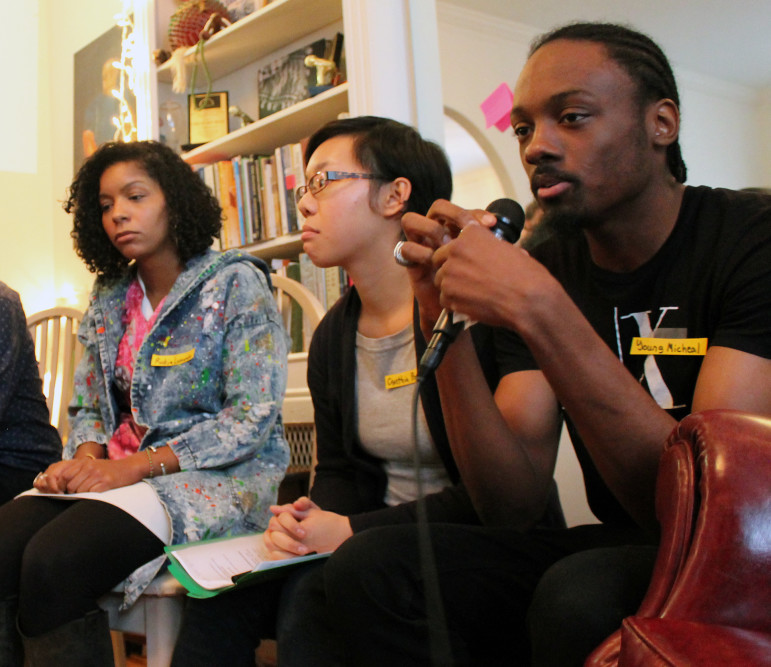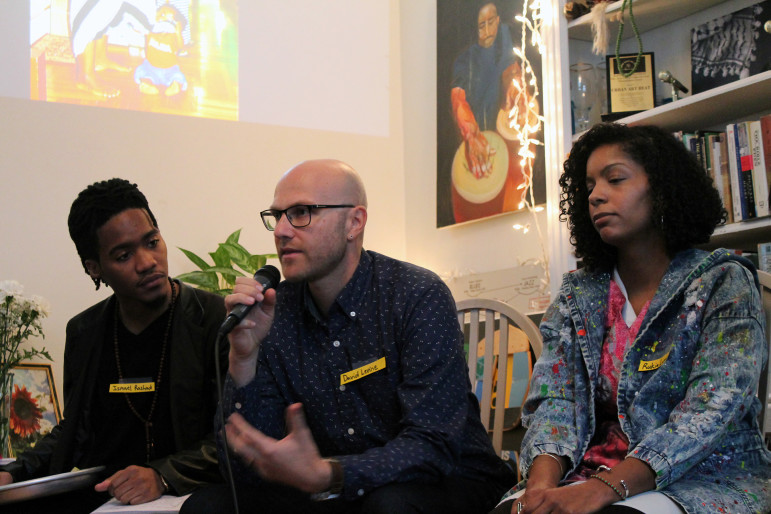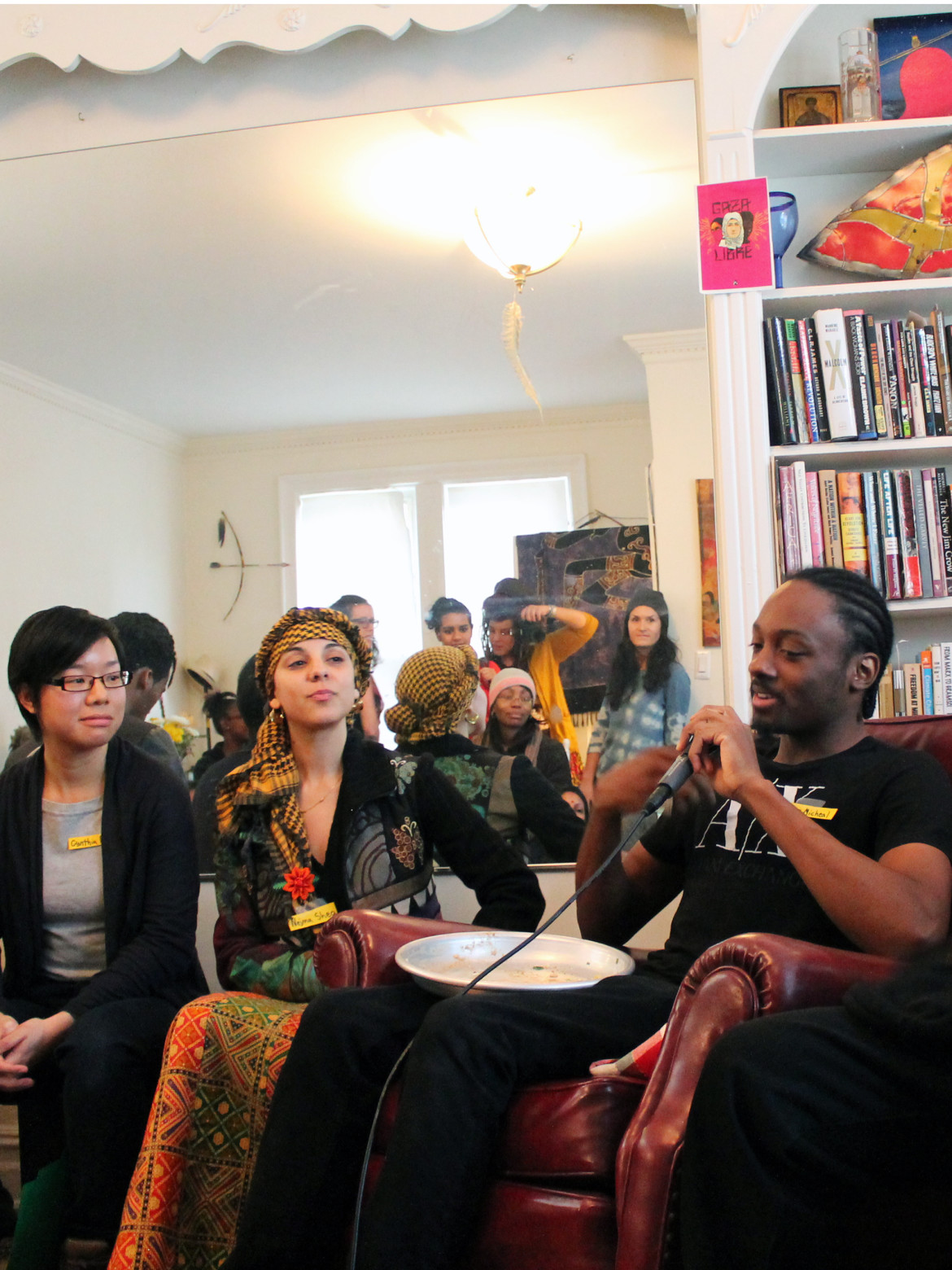
Hip-hop artist Youngmichael (holding mic) attributes his success to an alternative discipline program that allowed him to avoid incarceration and finish school. He spoke as a panelist at an event about the school-to-prison pipeline.
NEW YORK — He knew instantly he’d made a mistake. At the last minute, he tried to protect the woman, but that only angered her assailant, who hit her harder, knocking her to the ground.
That assailant was someone Daryl Mensah-Bonsu, then 15, had considered a friend, a more popular teen who invited him along to visit some girls in Brooklyn’s Sheepshead Bay neighborhood. He says he had never been in trouble before and was pressured into stealing the woman’s pocketbook along the way.
“If not for alternative justice, I don’t think I would have survived,” said Mensah-Bonsu, an entertainer who goes by the name Youngmichael.
 He was a panelist Sunday in Brooklyn, at an event the New Black Arts Movement organized to highlight programs and individuals working to stop the school-to-prison pipeline. About 40 parents, teachers, students and community members attended. It coincided with #ReclaimMLK activities being held across the country this weekend to honor the legacy of Dr. Martin Luther King Jr. by focusing on systems that work.
He was a panelist Sunday in Brooklyn, at an event the New Black Arts Movement organized to highlight programs and individuals working to stop the school-to-prison pipeline. About 40 parents, teachers, students and community members attended. It coincided with #ReclaimMLK activities being held across the country this weekend to honor the legacy of Dr. Martin Luther King Jr. by focusing on systems that work.
Although he was charged as an adult and could have been sentenced to seven years in prison, Youngmichael was given an opportunity to participate in an alternative program that allowed him to avoid incarceration, use his musical talent to serve his community and finish school.
But he knows most are not so lucky.
New York is one of only two states where 16-year-olds are automatically charged as adults. Gov. Andrew Cuomo has proposed raising the age to be charged as an adult, but legislation has stalled.
Raising the age will help, says educator David Levine, but keeping kids in school is key.
“We need to show students that by showing up, we have something to offer them,” he said. “Students need to see their school as a place of value, not as a place they’re stuck in.”

Left to right: Ismael Rashad, David Levine and Rukia Lumumba speak about how to stop the school-to-prison pipeline
Levine said alternative discipline is an opportunity to keep kids in school and reduce the number of days missed due to suspension. Restorative justice programs avoid suspensions by allowing participants to acknowledge the harm created, work together to make amends and build relationships in order to prevent future incidents.
Data reported by the New York City Department of Education and compiled by the New York Civil Liberties Union (NYCLU) shows nearly 45,000 student suspensions were issued in 2014-15.
[Related article: The Case That Got Me Hooked on Restorative Justice]
While that number is down from nearly 53,000 the year before and a high of nearly 74,000 in the 2008-09 school year, black students and students with special needs are still over-represented. While black students make up only 26 percent of the student population, they receive more than 53 percent of the suspensions. Special education students receive more than 36 percent of the suspensions although they make up only 13 percent of all students.
 Rukia Lumumba, director of youth programs at the Center for Alternative Sentencing and Employment Services (CASES) says that’s still too high. Inequitable discipline and the trauma associated with witnessing school brutality affects all students, not just the victim, she said.
Rukia Lumumba, director of youth programs at the Center for Alternative Sentencing and Employment Services (CASES) says that’s still too high. Inequitable discipline and the trauma associated with witnessing school brutality affects all students, not just the victim, she said.
“I saw several of my friends carried out in handcuffs, brutally dealt with,” said Lumumba who lived in Detroit and New York before attending high school in Jackson, Mississippi.
“At that time I had three friends — one 14, one 15 and one 16 — that got life sentences,” Lumumba said. “That for me was the moment I decided this was going to be my life’s work.”
She also said she saw first-hand the lifelong damage school-based brutality and other abuses left on the Jackson community.
“When I was growing up, my family was very vocal,” said Lumumba. Her late father was human rights attorney Chokwe Lumumba, who died shortly after being elected mayor of Jackson in 2014.
“But people around us, because they had such a traumatic history of brutality, of family members being in prison or being killed, having their livelihoods threatened, they didn’t speak out,” she said.
Lumumba stressed the importance of healing as a community in order to participate in creating better educational and other opportunities for future generations.
Youngmichael agrees and says for him, an important step has been forgiveness.
“Of course, it’s about making it right with whoever has been harmed,” he said. “But it’s more than that, it’s about realizing that a mistake doesn’t have to be an end and learning to forgive ourselves so we can become stronger.”
Panelists included Lumumba, multimedia hip-hop artist Nejma Shea, former public defender Cynthia Pong, youth advocate Ismael Rashad, Levine and Youngmichael.
More related articles:
You Don’t Have to Be a Judge to Champion Change for Kids
Government Should Not Expel, Charge Students for Tasteless Speech
Schools Need Restorative Justice to Keep Kids Safe, Out of Trouble
